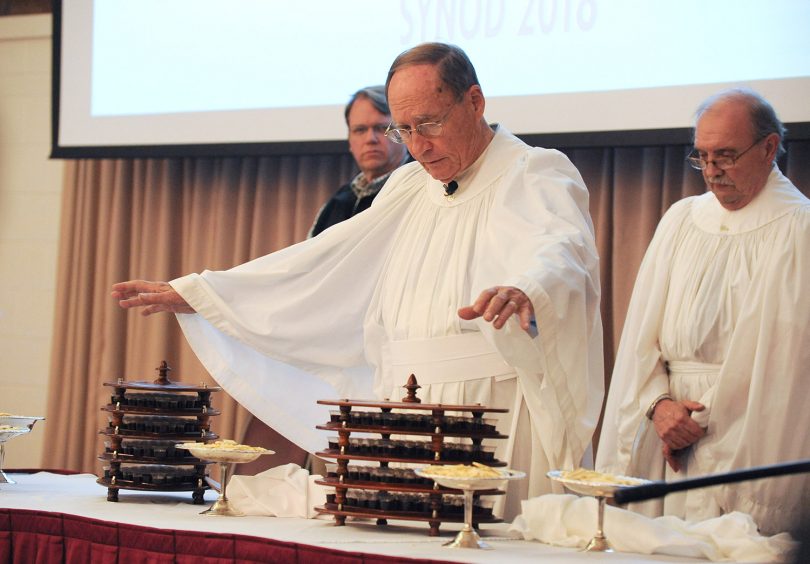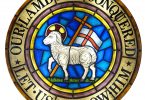In the sacrament of Holy Communion, God makes use of physical elements (bread and wine) so that with prayer and faith they become a means of experiencing God’s grace in a special way. Along with the sacrament of baptism, Holy Communion is a gift of God made effectual by the preaching of the Word and the response of faith.
Some Christians call this sacrament the Holy Communion, stressing the union it brings us with God and with other Christians. Others call it the Lord’s Supper, recalling that meal at which Christ instituted the sacrament. Sill others name it the Eucharist, from a Greek word meaning thanksgiving, for in this sacrament we give thanks for all that God does for us in our Savior Jesus Christ. All these names rightly focus upon various aspects of this sacrament given us by Christ.
Past, present, and future significance of Holy Communion
As we celebrate the Holy Communion, we are doing several things at once. In the first place, we are obeying Christ’s command, given at the last Supper, to “do this in remembrance of me” (Luke 22:19; 1 Corinthians 11:24-25). This is a special sort of remembering, however; for, as we share in the sacrament, it becomes for us the living sign of Christ’s sacrifice upon the cross, made for us once and for all time.
In Holy Communion we also give thanks to God for all that God has done in creating and sustaining us, and, most of all, for redeeming us in Jesus Christ. We pray for the Holy Spirit to make this sacrament of our crucified and risen Savior effective and real for us so that we may receive renewed assurance of the forgiveness of our sin and be strengthened to live new lives in Christ for witness and service in the world.
In receiving the elements of Holy Communion with faith and prayer we are truly joined to God in Christ and the Spirit. As we unite with our fellow members in the church in this act of worship, we also join with believers of all times and places who have celebrated this sacrament in the past. Moreover, as we share in this sacramental meal in the present, we anticipate the eternal banquet of God’s eternal and heavenly kingdom. In the Holy Communion, then, past, present, and future come together.
Christ’s presence in Holy Communion
Through the centuries there has been much discussion about Christ’s presence in the Holy Communion and how this presence is related to the physical elements (bread and wine) used in the sacrament. Some churches have maintained that when Christ said, “This is my body…this is my blood…,” he meant to leave us only a memorial meal. Others have insisted that Christ physically communicates his body and blood to us under the appearance of bread and wine. Still others have adopted positions somewhere in between.
The Moravian Church has always tried to avoid being drawn into such disputes. Our earlier theologians sometimes spoke of a special sacramental presence of Christ that was different from a tangible physical presence, but was at the same time more than merely remembering a departed friend as one ate and drank. In any case, the Moravian Church has always taught that we should thankfully receive the grace and blessings that God gives us in this sacrament without trying to specify too rigidly how Christ is present.
Celebrating Holy Communion
In a Moravian celebration of the Holy Communion the emphasis is on the grace and work of God for us in the life, death, and resurrection of Christ, made present and active through the Holy Spirit. Everything is to be done with simplicity and dignity. This is why our ministers wear a plain white robe (surplice) while presiding at the sacrament. This is not a badge of office or rank, but rather a symbolic blanking out of the minister’s individual personality and ideas. Ultimately, it is not the minister but Christ who presides at the sacrament, consecrates its elements, and gives grace as these elements are distributed and received.
Who may receive Holy Communion
Baptized members of the church may receive Holy Communion. This includes those who were baptized as adults and those who were baptized as children and have affirmed their baptism in confirmation. Baptized children, as they can begin to appreciate the gifts of Christ in Holy Communion, are also invited to partake of this sacrament after appropriate preparation by parents and pastors.
Holy Communion and Christian unity
Emphasis on baptism and Holy Communion as gifts of God’s grace helps explain why the Moravian Church practices open rather than closed communion. This means that members of other Christian churches are invited to receive Holy Communion in our services. We believe that, in the sacrament of baptism, God in Christ makes us all members of the one, holy, and universal church, and not just members of a particular denomination. Likewise, we believe that at the Holy Communion we gather at the Lord’s Table and not our own, and that the sacrament is intended for Christians of all denominations.
This does not mean that we regard the sacrament lightly. Our services encourage prayerful preparation before receiving it. We do not, however, feel compelled to make one pass a theological examination before receiving this means of grace. We pray and work for the time when God’s sacrament of Holy Communion may be a means of proclaiming and nourishing the union of all Christians in the one church of Jesus Christ.
Holy Communion and social responsibility
God’s grace is never given only for our selfish benefit. As we receive love, forgiveness, and new life in God’s grace, that same grace directs us to proclaim the good news and share those gifts of God with others. As the Holy Communion recalls the ministry of Christ, strengthens our faith now, and anticipates the blessings of the heavenly realm, God also calls us to go out into the world to correct those inequalities and injustices that oppose Christ’s rule. Christ in the Holy Communion does not allow us to feed our souls in contentment while others are starving. Christ calls us to go with him among the poor, the sick, the homeless, and the persecuted so that all may share in the feast of God’s visible and invisible gifts.
From the Moravian Church Brochure “The Sacrament of Holy Communion,” 2010




